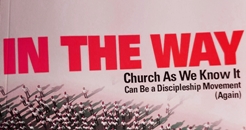 Contrasting 'Church as we know it' and 'Disciple-multiplying movements' - 3
Contrasting 'Church as we know it' and 'Disciple-multiplying movements' - 3
From a talk by Simon Holley and a book In the Way by Damian Gerke
The previous article in this series is here.
Following on from interest in the articles, Repositioning church as a mission agency and The Underground, I listened to a talk by Simon Holley, who leads the eldership and strategic leadership teams at King’s Arms Church in Bedford. He also leads the team that serves the Catalyst family of churches. He recently gave a brief talk on some of the principles and practices of Disciple Making Movements to start the conversation.
The premise of the book 'In the Way' is that church as it is currently practiced in the West is not the only model of church and, if multiplication is the desired outcome, it is in fact an inferior model.
The book contrasts 25 aspects of ministry which highlight the differences between a 'Disciple-multiplying movement' and 'Church as we know it'. Leaving out some for brevity, let's look at some more contrasts between 'Church as we know it' and a 'Disciple-multiplying movement':
4. How the Church engages with people
Church as we know it
|
Disciple-multiplying movement
|
Its Ministry Approach is Appeal. Appeal to people based on their affinity or self-interests. Marketing to people who are seeking a church with a certain profile. Creates consumers for a church that meets my and my families needs.
|
Its Ministry Approach is Call. Invites people to a calling to join a movement that will change the world forever. Lifelong commitment that with a high bar for entry - willingness to give up your old life on the promise that God will give you a new one.
|
Cultural impact is Extraction. Leave current culture, come to church culture and return to original culture for rest of week. Over time, their relationships in the original culture atrophy.
|
Cultural impact is Infusion. Disciples practice their faith inside their current culture and relationships. People hear gospel from someone they know and trust and expressed in terms they can understand.
|
Simon comments:
Extraction vs. Infusion
Let’s say Sarah gets saved - Sarah’s a mother married with two kids. A friend invites her to Alpha - she is sceptical but her father recently passed away and it’s left her with big questions. So she comes and to her surprise, she gets saved. Sarah is committed. Her husband is not against it - she seems happier - but he’s also not interested. Her kids come to a couple of things - but they never really stick. Sarah is all in though. She starts to serve on Alpha, then on a Sunday, then on another mid-week group. Church rejoices - Sarah’s life has turned around. But take a look from her family’s perspective - suddenly Mum who was around all the time is now out two nights a week and for a huge chunk of Sunday morning. She starts to speak using words they’ve never heard before. They used to know her friends - now they don’t. To the family - they’ve lost Mum to the church.
It doesn’t always play out that way - but I’ve seen that pattern too many times.
Problem is extraction - our methods have extracted Sarah from her community rather than trained her to infuse her community with the gospel.
It’s also not the way Jesus modelled - look at the Gaderene demonic. Look at Samaritan women. Jesus sent people back in way too soon as far as we are concerned. Something's wrong with our paradigm. It’s not that we shouldn’t cause Sarah to belong to something - we should - but we should do that at the same time as training her to become a multiplying disciple in her own community.
5. How people engage with the Church
Church as we know it
|
Disciple-multiplying movement
|
Participation is Passive. The service is planned in advance. The songs are selected,. The sermon is prepared by someone digging into the Bible, preparing suggestions on applying truth. Generally, someone else is studying, thinking, praying, revealing insight - so why should attendees do it for themselves?
|
Participation is Active Obedience. Following Jesus' call to teach others to obey his commands. Deliberately practicing his teachings and way of life, guided by the Holy Spirit. This cannot be built by passive approaches but only through practice.
|
Interaction is Knowledge Sharing.
|
Interaction is Mutual Accountability.
|
The next part of this series is here.
Retweet about this article:
From a talk by Simon Holley and a book In the Way, 22/03/2022